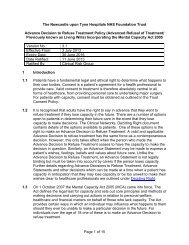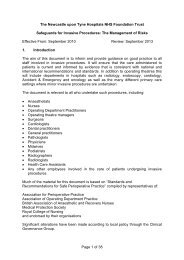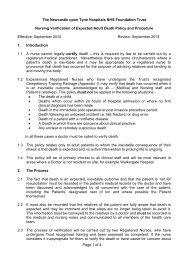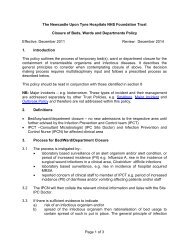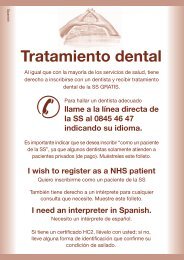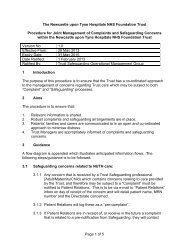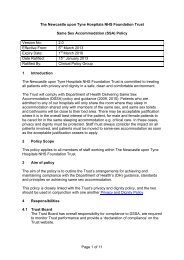Policy and Procedure - Newcastle Hospitals
Policy and Procedure - Newcastle Hospitals
Policy and Procedure - Newcastle Hospitals
Create successful ePaper yourself
Turn your PDF publications into a flip-book with our unique Google optimized e-Paper software.
to manage the consignment. Prior to signing any consignment agreement, a draftversion should be sent to the Supplies <strong>and</strong> Procurement Director for approval.5 Definitions5.1 "Consignment Products" means those products belonging to the Company<strong>and</strong>/or its affiliates specified in the Consignment Stock Agreement.5.2 "Consignment Stock" means the stock of the Consignment Products held bythe Customer at the Facility on a consignment basis.5.3 "Facility" means such storage <strong>and</strong>/or warehousing facility of the Customer asthe Customer shall specify to Company for the receipt <strong>and</strong> storage of theConsignment Stock.5.4 “Replenishment” means the process by which the Customer will order <strong>and</strong> payfor replacements of Consignment Products it has consumed from theConsignment Stock.6 When <strong>and</strong> when not to consignReasons to support the consignment of products include:6.1 To avoid the risk of obsolescence, for example:• to ensure the availability of the required single-use sterile productsused in a surgical procedure (e.g. spinal fixation, breast reconstruction),a wide range of types <strong>and</strong> sizes may be required, but most usage willbe from a narrower “core” range. Consequently, there is a risk thatproducts at the extremes of the type/size range, whilst stocked in casethey are needed, may not be used <strong>and</strong> may then go beyond their usebydate. If the Trust owns such stock, it will assume the risk ofobsolescence. If the stock is consigned then the supplier will assumethis risk (subject to the consignment agreement being clear on thispoint – see sections 7 <strong>and</strong> 9)• it may be that a particular range of products is used by only one or twosurgeons; were the stock to be owned by the Trust <strong>and</strong> these surgeonsto leave the Trust then the risk of obsolescence will be met by the Trust.If the stock is consigned, then it can be returned to the supplier whenno longer required at no risk to the Trust.6.2 To avoid significant <strong>and</strong> unnecessary financial investment in stock<strong>and</strong>/or instrumentation, for example:• where a wide range of types <strong>and</strong> sizes of single-use sterile consumableproducts are required to enable selection of the correct type/size for aparticular patient procedure then the necessary financial investment instock can be disproportionate to the expenditure on products used inPage 2 of 23
such procedures. Taking consignment stock can mitigate thisrequirement with the Trust paying only for products actually used.• where an instrument tray containing a wide range of types <strong>and</strong> sizes ofnon-sterile consumable products is required to enable selection of thecorrect type/size for a particular patient procedure, then the necessaryfinancial investment in stock can be disproportionate to the expenditureon products used in such procedures; taking consignment stock canmitigate this requirement with the Trust paying only for productsactually used.• where, in order to use a particular consumable product, specificassociated surgical instruments are required, again with significantfinancial investment, suppliers may agree to consign instrumentation toenable the Trust to use their products.• where expensive next-day deliveries to support emergency procedurescan be avoided by holding consignment stock of products <strong>and</strong>instrumentation.6.3 Reasons to question the consignment of products include:6.3.1 When the benefit arising from the consignment is more for the supplierthan for the Trust, for example:• a supplier’s motive in offering consignment of products willgenerally be to ensure that their product is readily available on atheatre’s stockroom shelves <strong>and</strong> therefore more likely to be used. Ifthe Trust will not benefit reasonably via the supporting reasonsoutlined above then the consignment arrangement should not bepursued.6.3.2 When the cost of replenishing the consignment is punitive bycomparison with replacing Trust-owned stock, for example:• a supplier may apply differential pricing for replenishingconsignment stocks by comparison with replacing Trust-ownedstock – this might be by not providing a level of discount otherwiseoffered or by charging higher prices. Where any additional costoutweighs any risk-mitigating <strong>and</strong> financial benefit to the Trust thenthe consignment arrangement should not be pursued.6.3.3 When the supplier providing the consigned product is not prepared toprovide quantities of products to support the activity levels of theDirectorate, for example:• a supplier may be wish to restrict the quantities of each product inthe consigned stock to a level which the Directorate considerinadequate <strong>and</strong> would therefore need to supplement the consignedstock of an individual product with Trust-owned stock of the sameproduct. This is highly likely to lead to confusion over ownership of<strong>and</strong> liability for consigned <strong>and</strong> Trust-owned product <strong>and</strong> therefore,in such circumstances the proposed consignment arrangementshould be declined.Page 3 of 23
The decision as to when <strong>and</strong> when not to consign is ultimately forDirectorate’s to make <strong>and</strong> will involve balancing the supporting <strong>and</strong>questioning reasons outlined above. If in doubt, advice can be sought from theTrust Supplies <strong>and</strong> Procurement Director.7 Liability for consigned productsThe liabilities in respect of the consigned products are defined in the TrustConsignment Agreement Form (see section 9) <strong>and</strong> key points are as follows:7.1 The Trust will be liable for any physical loss or damage to products whilst heldon their premises, hence the requirement for safe <strong>and</strong> secure storage. Theremedying of any financial loss will be met by the Directorate’s budget, by wayof a requisitioned <strong>and</strong> ordered replacement for the loss or damaged product.Any such loss should be reported to the Finance Directorate for inclusion inthe Trust’s Losses <strong>and</strong> Compensation Register.7.2 The Trust will be liable for replacing any consigned product it has consumed,maintaining the product types <strong>and</strong> quantities detailed in the consignmentagreement. Replenishment of consumed items should be arranged by way ofa requisition <strong>and</strong> order.7.3 The supplier will be liable for any loss arising from products going beyondtheir “use-by” or “expiry” dates <strong>and</strong> will replace any such products at nocharge to the Trust, maintaining the product types <strong>and</strong> quantities detailed inthe consignment agreement. To enable the supplier to meet this obligation,the Trust will provide the supplier with accompanied access to their consignedstock but only by prior arrangement.Where consignment agreements based on agreement forms other than the TrustConsignment Agreement Form (see section 8) have been entered into prior to theimplementation of this policy, Directorate’s should ensure that the key points detailedabove are consistent, particularly in respect of supplier liabilities. If not, thenwherever possible the agreement should be replaced with one based on the TrustConsignment Agreement Form.8 IndemnityThere are two types of supply – one where the sale of goods involves a financialtransaction between the parties <strong>and</strong> one where no financial transaction occurs. In theformer, the Sale of Goods Act applies, but where no financial transaction is involved,the Sale of Goods Act does not apply <strong>and</strong> would not therefore provide indemnity forthe Trust. In such situations, indemnity can be provided via a Master IndemnityAgreement (MIA) scheme managed by the Department of Health with which mostreputable suppliers are registered. Before entering in to a consignment agreement,Directorates should check that the supplier is registered with the DH MIA Scheme byenquiring via the following link: http://nhsmia.bipsolutions.com/If the supplier is not registered with the DH MIA scheme then, as a general rule, theconsignment stock arrangement should not be pursued. In exceptionalPage 4 of 23
circumstances, supplier specific Indemnity Forms can be signed but in suchcircumstances, advice should be sought from the Trust Supplies <strong>and</strong> ProcurementDirector.9 Consignment Agreement FormThe Trust has a st<strong>and</strong>ard Trust Consignment Agreement Form (attached asAppendix A) which from the effective date of this policy should be used for allconsignment arrangements. The agreement form includes a schedule listing theproduct types <strong>and</strong> quantities consigned. Where consignment arrangements havebeen established prior to the effective date of this policy <strong>and</strong> are based on asupplier’s consignment agreement form, the agreement should be checked to ensurecompliance with the key points identified in Section 7. If the agreement is notconsistent on these key points, particularly in respect of supplier liabilities thenwherever possible, the agreement should be replaced with one based on the TrustConsignment Agreement Form. The following procedure should be adopted inrelation to the Trust Consignment Agreement Form:• A draft version of the completed agreement form should be provided tothe Trust’s Supplies <strong>and</strong> Procurement Director for approval.• On receipt of such approval, the agreement should be signed by theDirectorate Manager or nominated deputy <strong>and</strong> the supplier.• An original signed copy of the agreement <strong>and</strong> schedule should be held bythe Directorate.• An original signed copy of the agreement <strong>and</strong> schedule should beprovided to the supplier.• A copy of the agreement <strong>and</strong> schedule should be sent to the TrustSupplies Department marked for the attention of Supplies Team 2.• If products are added to or removed from the consignment stock, aChange Control Note (Appendix B) should be completed together with anaddendum to the product-listing schedule (i.e. Annex 1 to theConsignment Agreement Form) <strong>and</strong> actioned in terms of signature <strong>and</strong>copying as the original agreement.A flowchart detailing the relevant steps within the process is attached as AppendixD(i) <strong>and</strong> Appendix D(ii).10 Replenishing the ConsignmentIt is the Trust’s responsibility to replenish the consignment when it has consumedproduct. This should be effected by Directorates raising a non-stock requisition formfor the required products <strong>and</strong> submitting it to the Trust Supplies Department. Therequisition content <strong>and</strong> format should be in all respects the same as forreplenishment of Trust-owned product other than the annotating of the requisition“Replenishment of Consignment Stock”. In some circumstances (e.g. for implantableproducts), suppliers may require the Trust to inform them of the batch, lot or serialnumbers of consumed product <strong>and</strong> in such circumstances this information should beprovided on the requisition form for transcription onto the Trust’s official order.Page 5 of 23
11 Storage, Management <strong>and</strong> Stocktaking of Consigned Products11.1 Consigned products should be stored in a safe <strong>and</strong> secure environment – theTrust is liable for any physical loss or damage to products whilst held on Trustpremises.11.2 Whilst the supplier will be responsible for replacing at no charge anyconsigned product which goes beyond its expiry date, products should beused in date order with the shortest expiry date product used first.11.3 Consigned products should be stored in a way which enables them to beclearly differentiated from Trust-owned stock. Unless specifically agreed to bysuppliers, neither the products nor their packaging should be marked in anyway to assist this differentiation – marking the product or packaging is likely tomake it non-returnable to the supplier.11.4 The supplier should be provided with access to the consigned stock for thepurposes of inspecting <strong>and</strong> recording quantities, quality <strong>and</strong> condition of theconsigned products. This inspection which will be undertaken at least every 6months should be by appointment only <strong>and</strong> the supplier should beaccompanied by an appropriate member of staff. A written record should beprovided by the supplier, signed by both parties <strong>and</strong> a copy kept on file. Anyproducts beyond their expiry date should be replaced by the supplier <strong>and</strong> anyshortages or damaged product should be replaced by the Directorate by wayof a requisition <strong>and</strong> official order. The loss should be recorded by theDirectorate in the Trust’s Losses <strong>and</strong> Compensation Register maintained bythe Finance Directorate. Any discrepancy (shortages or damage) advised bythe supplier more than 3 months following the inspection will be consideredinvalid, this point being confirmed in the Trust’s Consignment AgreementForm.11.5 In exceptional circumstances, the supplier may be permitted to removeconsigned products for urgent supply to other healthcare providers – a recordshould be kept showing the date of removal <strong>and</strong> replacement by the supplier.In no circumstances should the supplier be permitted to remove consignedinstrumentation for supply to other healthcare providers.11.6 When stocktaking, Directorates should omit consigned products from theirstock count <strong>and</strong> stocktaking return.12 Termination of Consignment AgreementsWhen a consignment arrangement is no longer required <strong>and</strong> terminated, it isimportant that accurate records are maintained confirming the return <strong>and</strong> removal ofthe consigned products. The stock should be replenished to the levels detailed inthe consignment agreement <strong>and</strong> the products should be set aside for return. AConsignment Termination Form (see Appendix C) should be completed <strong>and</strong> signedby the Directorate Manager or nominated deputy. The form should be countersignedby the supplier prior to removal of the consigned product. The following procedureshould be adopted in relation to the Consignment Termination Form:Page 6 of 23
• The form should be signed by the Directorate Manager or nominated deputy<strong>and</strong> the supplier.• An original signed copy of the form should be held by the Directorate.• An original signed copy of the form should be provided to the supplier.• A copy of the form should be sent to the Trust Supplies Department markedfor the attention of Supplies Team 2.A flowchart detailing the relevant steps within the process is attached as AppendixD(iii)13 Equality <strong>and</strong> DiversityThe Trust is committed to ensuring that, as far as is reasonably practicable, the waywe provide services to the public <strong>and</strong> the way we treat our staff reflects theirindividual needs <strong>and</strong> does not discriminate against any individuals or groups on anygrounds. This document has been properly assessed.14 Monitoring ComplianceA Trustwide record of all consignment stock arrangements, current <strong>and</strong> terminated,shall be held by the Trust Supplies Department by way of copies of all ConsignmentAgreement Forms <strong>and</strong> Consignment Termination Forms.St<strong>and</strong>ard/process/issueConsignment StockAgreementChange ControlTermination ofConsignment StockAgreementMonitoring <strong>and</strong> auditMethod By Committee FrequencyAll Consignment Supplies <strong>and</strong>At initiationStock Agreements Procurementof theare approved prior to DirectoragreementsignatureAll Change ControlRequests areinitiated, approved<strong>and</strong> recorded by theDirectorate Manager(copied to thesupplier <strong>and</strong> suppliesteam 2)The Termination of aConsignment StockAgreement isinitiated, approved<strong>and</strong> recorded by theDirectorate Manager(copied to thesupplier <strong>and</strong> suppliesteam 2)DirectorateManagerDirectorateManagerAt initiationof therequiredchangesAt theterminationof theagreement15 Consultation <strong>and</strong> ReviewThe Consignment Stock <strong>Policy</strong> <strong>and</strong> <strong>Procedure</strong> was developed <strong>and</strong> reviewed by aworking group chaired by the Supplies <strong>and</strong> Procurement Director <strong>and</strong> comprising:Mr A Pike, Asst Directorate Manager, Peri-Operative <strong>and</strong> Critical Care; ChargePage 7 of 23
Nurse R Fenwick, Maxillo Facial Theatres, RVI; Sr Christine Szijarto, PlasticsTheatre, RVI; Sr Ee Suan Yeo, Neurosurgery Theatres, RVI; Sr Angela Carr,Orthopaedic Theatres, Freeman; Sr Am<strong>and</strong>a Hill, Catheter Labs, Freeman; SrJocelyne Cumberledge, Cardiothoracic Theatres, Freeman; Sr Carol Ewen,Interventional Radiology, Freeman; Brian Maxwell, Storekeeper, OrthopaedicTheatres, Freeman; Mr I Bestford, Head of Corporate Financial Management; Miss PBurrill, Asst Supplies Manager; Mr P Millar, Senior Buyer; <strong>and</strong> Mrs L Fitzgerald,Senior Buyer.The document was endorsed by the Supplies <strong>and</strong> Services Procurement Committeeat their meeting of the 3 rd June 2013.16 Implementation (including raising awareness)The <strong>Policy</strong> <strong>and</strong> <strong>Procedure</strong> for the Consignment of Clinical Consumables, Devices<strong>and</strong> Surgical Instruments from Suppliers will be circulated to Directorate Managers,disseminated via the Theatre User Group <strong>and</strong> published on the Trust’s Intranet.17 Associated DocumentationH<strong>and</strong>ling of Surgical Instruments on LoanPage 8 of 23
Appendix ACONSIGNMENT STOCK AGREEMENTDATED:BETWEEN:(1) The <strong>Newcastle</strong> Upon Tyne <strong>Hospitals</strong> NHS Foundation Trust, Freeman Hospital,High Heaton, <strong>Newcastle</strong> upon Tyne NE7 7DN ("The Customer"); <strong>and</strong>(2) …………………………………………………………………………………WHEREAS…….……………………………………………………… (“The Company”)(together the "Parties")The Customer requires the Company to supply those products listed in Annex 1 to theCustomer on a Consignment Stock basis <strong>and</strong> on the terms <strong>and</strong> conditions set outbelow.THEREFORE THE PARTIES HEREBY AGREE AS FOLLOWS:1 Definitions1.1 "Consignment Products" means those products belonging to the Company<strong>and</strong>/or its affiliates specified in Annex 1 to be supplied to the Customer pursuantto this Agreement <strong>and</strong> to be held by the Customer in the Consignment Stock.1.2 "Consignment Stock" means the stock of the Consignment Products held by theCustomer at the Facility on a consignment basis.1.3 "Facility" means such storage <strong>and</strong>/or warehousing facility of the Customer asthe Customer shall specify to Company for the receipt <strong>and</strong> storage of theConsignment Stock.1.4 “Replenishment” means the process by which the Customer will order <strong>and</strong> payfor replacements of Consignment Products it has consumed from theConsignment Stock.2 Obligations of the Parties2.1 The Company shall supply to the Customer <strong>and</strong> the Customer shall hold onconsignment at the Facility those Consignment Products required by theCustomer pursuant to this Agreement <strong>and</strong> detailed in Annex 1 hereto.2.2 As <strong>and</strong> when required for use by the Customer, the Customer shall physicallypick <strong>and</strong> remove from the Facility each required Consignment Product. In doingso, the Customer shall draw upon the stock of Consignment Products on a firstin/first out basisPage 9 of 23
Appendix A2.3 Within 14 days of the use by the Customer of a Consignment Product, theCustomer shall raise a purchase order to replenish the Consignment Stock <strong>and</strong>the Company shall raise <strong>and</strong> issue to the Customer an invoice for the sale ofsuch Consignment Product to the Customer.2.4 All purchase orders for Consignment Products to replenish the ConsignmentStock issued by the Customer shall at a minimum include details of producttype, product model, product catalogue number, quantity, price <strong>and</strong> purchaseorder number.2.5 All orders for <strong>and</strong> deliveries of Consignment Products to replenish theConsignment Stock made pursuant to this Agreement <strong>and</strong> each sale ofConsignment Product by the Company to the Customer hereunder shall (saveas superseded by the provisions of this Agreement) be made on the NHS Terms<strong>and</strong> Conditions for Sale of Goods as specified in Annex 2 <strong>and</strong> at the pricesreferenced in Annex 1.2.6 All deliveries of Consignment Products to replenish the Consignment Stock shallbe made by the Company to the Facility <strong>and</strong> shall be tracked, registered <strong>and</strong>delivered to the Facility with accompanying transport documentation clearlystating the purchase order number for such products <strong>and</strong> referencing that suchproducts are Consignment Products.2.7 The Company representative <strong>and</strong> a Customer representative from theCompany’s department holding the Consignment Stock will by appointmentcarry out regular stock checks to establish the following:(a) that products which are out of date are removed <strong>and</strong> replaced by theCompany(b) that stock levels are adequate to provide for current usage(c) that stock rotation is occurring (First In First Out)3 Payment TermsThe Customer shall make payment in full for each purchase of Consignment Productsto replenish the Consignment Stock within 30 days from the receipt of an invoiceissued by Company. Payment shall be made by BACS to the Company.4. Consignment Stock <strong>and</strong> Storage4.1 The Customer shall store the Consignment Products in a secure location at theFacility in accordance with all instructions provided by the Company <strong>and</strong> allstorage conditions indicated on the packaging of the Consignment Products.4.2 Following delivery of the Consignment Products by the Company to the Facility,the Consignment Products shall not be moved or removed from the Facility bythe Customer other than for use in accordance with the provisions of clause 2,for return to the Company pursuant to clause 4.7 or 6.3, or with the prior writtenconsent of the Company.Page 10 of 23
Appendix A4.3 Following delivery of the Consignment Products by the Company to the Facility,the Consignment Products shall not be moved or removed from the Facility bythe Company other than pursuant to clause 4.7 or 6.3, or in exceptionalcircumstances where Consignment Products are removed by the Company forurgent use by another healthcare provider <strong>and</strong> replaced by the Company in duecourse. In such circumstances, a signed record shall be maintained by theCompany <strong>and</strong> the Customer showing the date of removal <strong>and</strong> return. For theavoidance of doubt, such exceptional circumstances shall not apply toconsigned surgical instrumentation.4.4 The Customer shall h<strong>and</strong>le <strong>and</strong> store the Consignment Products with all duecare <strong>and</strong> skill so as to maintain them in perfect condition <strong>and</strong> shall protect theConsignment Products from any loss or damage.4.5 The Customer will visibly demarcate the Consignment Stock as the property ofthe Company keep the Consignment Stock separate from other goods kept instock including other products purchased from the Company so that it shall beimmediately clear that the Consignment Products are Consignment Stock <strong>and</strong>are the property of the Company.4.6 The Parties agree that the Company <strong>and</strong> its authorised representatives shallbe entitled at an agreed time (<strong>and</strong> in any event no less than every six months)on the giving of reasonable notice, to inspect the Facility to audit <strong>and</strong> verify thecontents, quantity, quality <strong>and</strong> condition of the Consignment Products providedin the Consignment Stock <strong>and</strong> their conditions of storage. A written recordshowing Consignment Stock quantities, quality <strong>and</strong> condition at the time ofinspection shall be made by the Company, signed by both parties with a copyprovided to both parties. Any discrepancy between the quantities ofConsignment Products counted <strong>and</strong> those detailed on Annex 1 or in the qualityor condition of any Consignment Product should be advised to the Customer bythe Company immediately. Any discrepancy advised to the Customer by theCompany more than 3 months following the inspection shall be consideredinvalid.4.7 Following inspection of the Consignment Products in the Consignment Stock bythe Parties as provided for in clauses 2.7 <strong>and</strong> 4.4. hereto, any ConsignmentProducts which are no longer within their use-by or expiry date will be removed<strong>and</strong> replaced by the Company at no cost to the Customer. A record of anyConsignment Products removed for replacement will be prepared by theCompany <strong>and</strong> signed by the Parties prior to removal <strong>and</strong> a similar recordprepared by the Company <strong>and</strong> signed by the Parties on receipt of thereplacement Consignment Products.5. Title <strong>and</strong> Risk <strong>and</strong> Insurance5.1 Title <strong>and</strong> ownership of the Consignment Stocks shall remain with the Companyuntil payment in full for each specific Consignment Product has been receivedby the Company from the Customer, at which point title <strong>and</strong> ownership shalltransfer to the Customer.Page 11 of 23
Appendix A5.2 Other than as detailed in 5.3 below, the risk of loss <strong>and</strong> damage to theConsignment Products shall remain with the Company until their delivery to theFacility. The Customer shall be responsible for any loss or damage caused tothe Consignment Stocks following their delivery to the Facility.5.3 The risk of loss to the Consignment Stock arising from Consignment Productsexceeding their use-by or expiry dates shall in all circumstances remain with theCompany.5.4 The Customer shall insure the Consignment Stocks against loss or damage dueto fire, flood, theft <strong>and</strong> other such risks via the NHS Litigation Authority RiskPooling Scheme.5.5 The Company will indemnify the Customer in respect of its liabilities inaccordance with <strong>and</strong> via its participation in the NHS Master IndemnityAgreement (MIA) scheme, see http://nhsmia.bipsolutions.com/6. Term <strong>and</strong> Termination6.1 Subject to clause 6.2, this Agreement shall commence as of the date specifiedon the front page of this Agreement <strong>and</strong> shall remain in force until terminated byeither party.6.2 This Agreement may be terminated at any time by either party on theservice of one month's written notice to the other.6.3 On any termination of this Agreement the Company shall arrange to uplift allConsignment Products still held by the Customer in the Consignment Stocks.7 Law <strong>and</strong> Jurisdiction7.1 This Agreement shall be governed by English law <strong>and</strong> the English courts shallhave exclusive jurisdiction over any disputes arising hereunder.IN WITNESS WHEREOF, The undersigned agree to the terms <strong>and</strong> conditions of thisAgreement <strong>and</strong> Annexes heretoSigned by:Date:……………………………………..Print Name:…………………………Job Title:For <strong>and</strong> on behalf of [the COMPANY]Page 12 of 23
Appendix ASigned by:Date:……………………………………..Print Name:………………………………………………………………..Job Title:For <strong>and</strong> on behalf of[THE NEWCASTLE UPON TYNE HOSPITALS NHS FOUNDATION TRUST]Page 13 of 23
Appendix AAnnex 1List of Consignment ProductsProduct Description Product Reference Unit of Supply ReplenishmentPrice per Unit ofSupply(£)Page 14 of 23
Appendix ANHS Conditions of Contract for the Purchase of GoodsSeptember 2010Page 15 of 23
Appendix BCONSIGNMENT STOCK AGREEMENTCHANGE CONTROL NOTEDATED:BETWEEN:(1) The <strong>Newcastle</strong> Upon Tyne <strong>Hospitals</strong> NHS Foundation Trust, FreemanHospital, High Heaton, <strong>Newcastle</strong> upon Tyne NE7 7DN ("TheCustomer"); <strong>and</strong>(2) ……………………………………………………………………………………….……………………………………………………… (“The Company”)(together the "Parties")WHEREASThe Parties entered into a Consignment Stock Agreement on [Date], they nowwish to amend that agreement by changing the quantity <strong>and</strong>/or type ofproducts consigned by the Company to the Customer. Accordingly the revisedenclosed Annex 1 document listing the quantity <strong>and</strong> type of productsconsigned, replaces Annex 1 to the original Consignment Stock Agreement.Signed for an on behalf of The<strong>Newcastle</strong> upon Tyne <strong>Hospitals</strong>NHS Foundation TrustSigned for on behalf of(Company Name)…………….…………………………………..……….. Signed………….…………….. Signed……………….………….. (Title)…………….…………….. (Title)…………………………… date……………….…………… datePage 16 of 23
Appendix BAnnex 1 to CCN (dated …….)List of Consignment ProductsProductDescriptionProductReferenceUnit of SupplyReplenishmentPrice per Unit ofSupply(£)Page 17 of 23
Appendix CCONSIGNMENT TERMINATION AGREEMENT FORMDATED:BETWEEN(1) The <strong>Newcastle</strong> Upon Tyne <strong>Hospitals</strong> NHS Foundation Trust, FreemanHospital, High Heaton, <strong>Newcastle</strong> Upon Tyne, NE7 7DN (“The Customer”);<strong>and</strong>(2) ………………………………………………………………………………………………………………………………………………………(“The Company”)(together the “Parties”)WHEREASThe Customer <strong>and</strong> the Company (the Parties) entered into a Consignment StockAgreement dated [date of original agreement] (copy attached) both Parties now wish toterminate the Agreement <strong>and</strong> confirm the following:1. All Consignment Products in the Consignment Stock have been inspected bythe Parties who together confirm:(i) that the quantities of Consignment Products in the Consignment Stockare consistent with the quantities specified in Annex 1 to the ConsignmentAgreement YES/NO*(ii) that the Consignment Products in the Consignment Stock are in acondition acceptable to the Company <strong>and</strong> not damaged in any wayYES/NO*2. The Consignment Products in the Consignment Stock have been uplifted bythe Company [or arrangements made for uplift on date] YES/NO*IN WITNESS WHEREOF, The undersigned agree that the Consignment StockAgreement is now terminated.Signed by:……………………………..Date:…………………………….Print Name:……………………………..Job Title:For <strong>and</strong> on behalf of [the COMPANY]Page 18 of 23
Appendix CSigned by:……………………………Print Name:Date:…………………………………………………………Job Title:For <strong>and</strong> on behalf of[THE NEWCASTLE UPON TYNE HOSPITALS NHS FOUNDATION TRUST]* Delete as appropriate. If any response is “NO”, explanatory comments should beadded below.Comments (if applicable)Page 19 of 23
Appendix DProcess for the Completion, Approval & Retention of Consignment Agreement Forms Appendix D(i)Directorate Manager PreparesConsignment Stock AgreementForm (Draft)Supplies <strong>and</strong> ProcurementDirector Approves DraftConsignment Agreement FormDirectorate Manager SignsConsignment Agreement FormSupplier Signs ConsignmentAgreement FormDirectorate Manager RetainsCopy of Signed ConsignmentAgreement FormCopy toSupplierCopy toSuppliesTeam 2Page 20 of 23
Appendix DProcess for Adding to or Removing Products from Consignment Agreement FormsAppendix D (ii)Directorate ManagerPrepares Change Control Note withaddendum to product‐listing scheduleSupplier Signs Change ControlNote with addendum toproduct‐listing scheduleDirectorate Manager Retainscopy of Change Control Notewith addendum to productlisting scheduleCopy toSupplierCopy toSuppliesTeam 2Page 21 of 23
Appendix DTermination of Consignment AgreementsAppendix D (iii)Directorate ManagerPrepares Consignment TerminationFormSupplier Signs ContractTermination FormDirectorate Manager RetainsSigned ConsignmentTermination FormCopy toSupplierCopy toSuppliesTeam 2Supplier UpliftsConsignment StocksPage 22 of 23
THE NEWCASTLE UPON TYNE HOSPITALS NHS FOUNDATION TRUSTIMPACT ASSESSMENT – SCREENING FORM AThis form must be completed <strong>and</strong> attached to any procedural document when submitted to the appropriate committee for consideration <strong>and</strong> approval.<strong>Policy</strong> Title:Consignment of clinical consumables, devices <strong>and</strong> surgical instruments fromsuppliers – <strong>Policy</strong> <strong>and</strong> <strong>Procedure</strong><strong>Policy</strong> Author:Yes/No?1. Does the policy/guidance affect one group less or more favourably than another onthe basis of:No• Race No• Ethnic origins (including gypsies <strong>and</strong> travellers) No• Nationality No• Gender No• Culture No• Religion or belief No• Sexual orientation including lesbian, gay <strong>and</strong> bisexual people No• Age No• Disability – learning difficulties, physical disability, sensory impairment <strong>and</strong>mental health problems.No2. Is there any evidence that some groups are affected differently? No3. If you have identified potential discrimination, are any exceptions valid, legal <strong>and</strong>/orjustifiable?n/a4(a).Is the impact of the policy/guidance likely to be negative?(If “yes”, please answer sections 4(b) to 4(d)).No4(b). If so can the impact be avoided? n/a4(c). What alternatives are there to achieving the policy/guidance without the impact? n/a4(d) Can we reduce the impact by taking different action? n/aComments:Lesley Fallon Deputy Assistant Supplies ManagerYou must provide evidence to support your response:Action Plan due (or Not Applicable):N/AName <strong>and</strong> Designation of Person responsible for completion of this form: Lesley Fallon Deputy Assistant Supplies Manager Date: 14 June 2013Names & Designations of those involved in the impact assessment screening process:ManagerMr David Hume, Supplies <strong>and</strong> Procurement Director; Mrs L Fallon, Deputy Asst Supplies(If any reader of this procedural document identifies a potential discriminatory impact that has not been identified on this form, please refer to the <strong>Policy</strong> Author identified above, togetherwith any suggestions for the actions required to avoid/reduce this impact.)For advice on answering the above questions please contact Helen Lamont, Director of Nursing, or, Christine Holl<strong>and</strong>, Senior HR Manager. On completion this form must be forwarded electronically to StevenStoker, Clinical Effectiveness Manager, (Ext. 24963) steven.stoker@nuth.nhs.uk together with the procedural document. If you have identified a potential discriminatory impact of this procedural document,please ensure that you arrange for a full consultation, with relevant stakeholders, to complete a Full Impact Assessment (Form B) <strong>and</strong> to develop an Action Plan to avoid/reduce this impact; both Form B <strong>and</strong>the Action Plan should also be sent electronically to Steven Stoker within six weeks of the completion of this form.IMPACT ASSESSMENT FORM A v4 July 2009



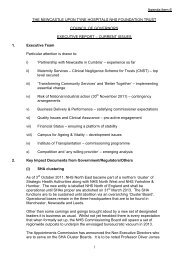
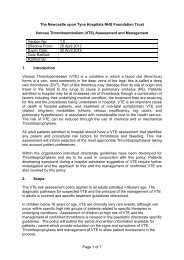
![Standard Precautions Policy - 112KB [PDF] - Newcastle Hospitals](https://img.yumpu.com/51150129/1/184x260/standard-precautions-policy-112kb-pdf-newcastle-hospitals.jpg?quality=85)
![Oxygen Management Policy - 38KB [PDF] - Newcastle Hospitals](https://img.yumpu.com/50798872/1/184x260/oxygen-management-policy-38kb-pdf-newcastle-hospitals.jpg?quality=85)
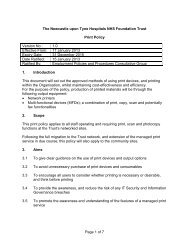
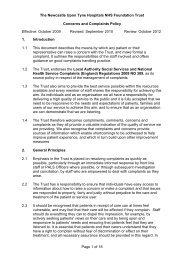
![Patient Identification Policy - 130KB [PDF] - Newcastle Hospitals](https://img.yumpu.com/49156101/1/190x245/patient-identification-policy-130kb-pdf-newcastle-hospitals.jpg?quality=85)
